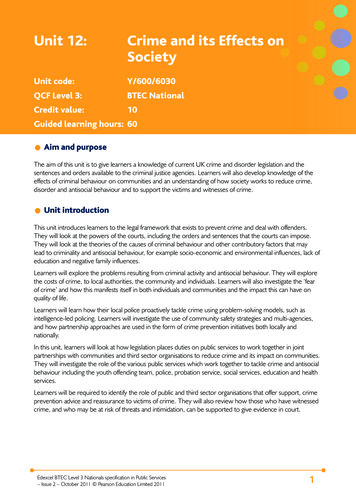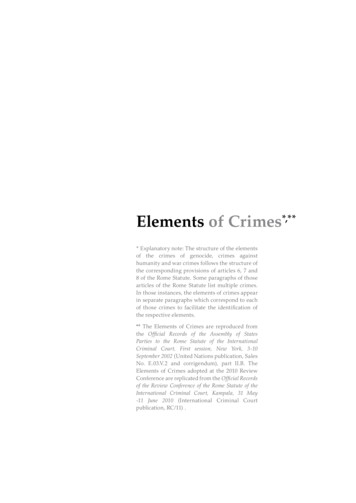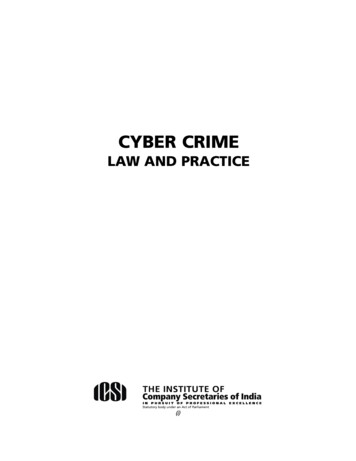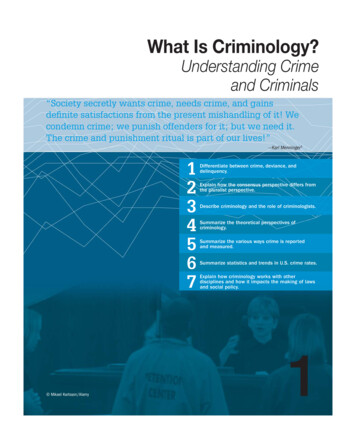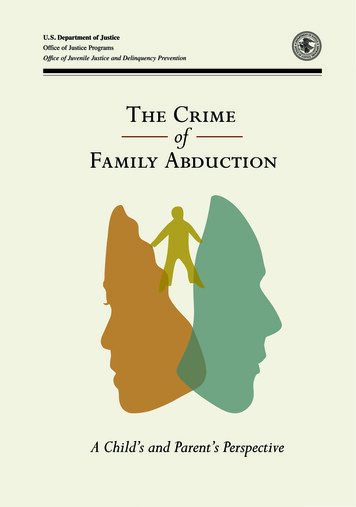
Transcription
U.S. Department of JusticeOffice of Justice Programs810 Seventh Street, NW.Washington, DC 20531Eric H. Holder, Jr.U.S. Attorney GeneralLaurie O. RobinsonAssistant Attorney GeneralOffice of Justice ProgramsJeff SlowikowskiActing AdministratorOffice of Juvenile Justice and Delinquency PreventionOffice of Justice ProgramsInnovation Partnerships Safer Neighborhoodswww.ojp.usdoj.govOffice of Juvenile Justice andDelinquency Preventionwww.ojp.usdoj.gov/ojjdpThis document was prepared by Fox Valley TechnicalCollege under cooperative agreement number2009–MC–CX–K058 from the Office of Juvenile Justiceand Delinquency Prevention (OJJDP), Office of JusticePrograms, U.S. Department of Justice.Points of view or opinions expressed in this documentare those of the authors and do not necessarily representthe official positions or policies of OJJDP or the U.S.Department of Justice.The Office of Juvenile Justice and DelinquencyPrevention is a component of the Office of JusticePrograms, which also includes the Bureau of JusticeAssistance; the Bureau of Justice Statistics; theCommunity Capacity Development Office; the NationalInstitute of Justice; the Office for Victims of Crime; andthe Office of Sex Offender Sentencing, Monitoring,Apprehending, Registering, and Tracking (SMART).First Edition, May 2010
Message From Attorney General Eric H. Holder, Jr.Family abduction is the most prevalent form of child abduction inthe United States. Regardless of the abductor’s motive, it is an illegalact that has lasting consequences for the abducted child, the custodialparent, and the abducting family member. It is a crime in all 50 statesand in the District of Columbia.Written with the help of six persons who have experienced familyabduction, this publication features valuable insights from a firsthandperspective. It is designed to provide the searching family, lawenforcement, and mental health professionals with strategies to builda comprehensive, child-centered approach to recovery and healing.Above all, this publication was prepared to support victims subjectedto the crime of family abduction.The Department of Justice is committed to protecting children andfamilies from harm. It is my hope that The Crime of Family Abduction:A Child’s and Parent’s Perspective will provide those impacted by thiscrime with the practical resources and support they need.Eric H. Holder, Jr.Attorney General
Message From Assistant Attorney General Laurie O. RobinsonEach year, more than 200,000 children become victims of familyabduction. Taken from family, home, and friends by a parent or otherfamily member, they are thrust into a life of uncertainty and isolation.As we work to protect children from harm, we must remain vigilant andinformed about the dangers that face children within our communities.A critical part of this responsibility begins with the recognition thatfamily abduction is a serious crime.This publication was written to provide victims and their familieswith knowledge and support in their time of crisis. For familiesundergoing this ordeal, there is comfort in knowing they are not aloneand there are resources dedicated to assisting them in the recoveryof their abducted children. The hard-earned knowledge provided inthis publication came at great cost. May it bear rich dividends inhelping others.Laurie O. RobinsonAssistant Attorney General
ForewordThe abduction of a child by another family member is one of the most devastatingcrises that a parent could ever encounter. The impact on the abducted child is alsotraumatic, as he or she grapples with a host of feelings, above all, a sense of betrayaland loss of trust. Nor are these the only persons harmed by family abduction.Brothers and sisters, grandparents, and other extended family, as well as friends arealso impacted.It is for these victims that The Crime of Family Abduction: A Child’s and Parent’s Perspectivewas written with the help of individuals with intimate knowledge of this crime.Protecting the well-being of children and their families lies at the very heart of themission of the Office of Juvenile Justice and Delinquency Prevention. We offer thisresource in the hope that it will help victims and their families in coping with theaftermath of family abduction—a crime in every sense of the word. For when weminimize the criminal nature of any abduction, we maximize the trauma experiencedby its victims.Jeff SlowikowskiActing AdministratorOffice of Juvenile Justice and Delinquency Preventionv
AcknowledgmentsThe Office of Juvenile Justice and Delinquency Prevention (OJJDP) is grateful toeveryone who devoted their time, energy, and passion to developing this publication,especially those who have experienced firsthand what it feels like to be abducted by aparent or to be the searching parent: Liss, Rebekah, Sam F., and Sam M., who are former child abductees. Daniel and CJ, who are former searching parents. Take Root, a peer-support network for adults who were abducted by familymembers as children, and its members. Team HOPE (Help Offering Parents Empowerment), a family-supportnetwork for searching families of abducted children affiliated with theNational Center for Missing & Exploited Children, and its members. Abby Potash, former searching parent, and Sheri Duncan, former abductedchild.OJJDP also thanks the many professionals who gave their time and effort to findchildren who were abducted by family members, who have worked to prevent familyabductions, and who have put together this publication for searching families andformer child abductees. These include consultants Lori St. Onge, Director ofAboriginal Justice, Mi’kmaq Confederacy of Prince Edward Island (PEI) and CaseManager for Child Find PEI; Julie Kenniston, Director of Training and Education,Butler County Children’s Services Board, Hamilton, OH; and retired police captainThomas Smith, Special Crimes Bureau Commander, Collier County Sheriff’s Office,Naples, FL. Special thanks go to Ron Laney, Associate Administrator, ChildProtection Division, OJJDP, and Helen Connelly and Harriet Heiberg of Fox ValleyTechnical College for their contributions to the preparation of this book.The final editing of this publication was performed by Ephy Amoah-Ntim,Tom Cullen, and Brian Higgins of Lockheed Martin’s Office of Justice ProgramsCommunications and Publications Support staff. The book was designed andproduced by Katherine Lenard of FasterKitty, LLC.The Crime of Family Abduction: A Child’s and Parent’s Perspective is dedicated to survivorsof family abduction and to those who are still working to recover their missingchildren.vii
About This BookThe U.S. Department of Justice reports that as many as 200,000 children are victimsof family abduction each year. Although the majority of abducted children are takennot by a stranger, but by a parent or family member, the issue of family abductionremains laden with misconception and myth. Serious missing-child cases that havedevastating effects on the child are too often seen as divorce and custody matters,something private that the public and law enforcement should not concern themselves with. The truth is that family abduction can be as physically dangerous andeven deadly for the child victims as any other form of child abduction. Most often,however, the worst damage is imperceptible to the eye, occurring deep within thechild, leaving traces that may last a lifetime.This publication offers insights into what it means to beabducted by a family member. Written from the perspective of the childand searching parent, it is designed to help you, the reader, understand the uniquecharacteristics of family abduction and the nightmare that they have experienced.Although the individual circumstances surrounding the authors’ cases show themultifaceted diversity of family abduction, the one thing they have in common is thatthey were all missing child cases. The child victims in these cases were concealed bytheir abductor, hidden not just from their searching family, friends, schools, andcommunity but also from the justice and child protection systems.The six primary contributors to this document—four adults who were victims offamily abduction as children and two searching parents—are active in the missingchild community. The former abducted child contributors are members of TakeRoot, an organization composed of former abducted children that provides peersupport and advocates on behalf of child victims. The parent contributors are eithermembers of Team HOPE (Help Offering Parents Empowerment), a support networkfor parents of missing children, oractive with nonprofit organizationsthat work around the issue of missingchildren.Misperceptions about family abductioncan potentially cause further traumato the abducted child. These misperceptions can also lead to an increase inthe incidence and duration of familyabductions. We hope that sharing thesestories will provide a new understanding of the devastating psychologicalix
harm and physical dangers that children who are abducted and concealed by familymembers often face. Our objective is to increase understanding of the crime offamily abduction and empower the reader to thoughtfully assist in the immediate andlong-term recovery of a child. Whether you are the searching parent, an abductedor former abducted child, a family member, a professional responder, a neighbor, ateacher, or an advocate, you can begin to comprehend what is happening and why achild-centered response, as outlined throughout this book, is so important.x
ContentsA Message From the Attorney General ! ! ! ! ! ! ! ! ! ! ! ! ! ! ! ! ! ! ! ! ! ! ! ! ! iA Message From the Assistant Attorney General ! ! ! ! ! ! ! ! ! ! ! ! ! ! ! iiiForeword ! ! ! ! ! ! ! ! ! ! ! ! ! ! ! ! ! ! ! ! ! ! ! ! ! ! ! ! ! ! ! ! ! ! ! ! ! ! ! ! ! ! ! ! ! ! ! ! ! ! ! ! ! ! vAcknowledgments! ! ! ! ! ! ! ! ! ! ! ! ! ! ! ! ! ! ! ! ! ! ! ! ! ! ! ! ! ! ! ! ! ! ! ! ! ! ! ! ! ! ! ! ! viiAbout This Book ! ! ! ! ! ! ! ! ! ! ! ! ! ! ! ! ! ! ! ! ! ! ! ! ! ! ! ! ! ! ! ! ! ! ! ! ! ! ! ! ! ! ! ! ! ! ixIntroduction! Family Abduction Is a Crime ! ! ! ! ! ! ! ! ! ! ! ! ! ! ! ! ! ! ! ! ! ! 1Abduction! Being Missing ! ! ! ! ! ! ! ! ! ! ! ! ! ! ! ! ! ! ! ! ! ! ! ! ! ! ! ! ! ! ! ! ! ! ! ! ! ! 7What Happens to a Child Who Is Abducted? ! ! ! ! ! ! ! ! ! ! ! ! ! ! ! ! ! ! 10The Search! Looking for the Abducted Child ! ! ! ! ! ! ! ! ! ! ! ! ! ! ! ! ! ! ! 21What Happens to a Narent Whose Child Has Been Abducted? ! ! ! !21What the Searching Narent May Be Feeling ! ! ! ! ! ! ! ! ! ! ! ! ! ! ! ! ! ! ! ! 29Recovery! Finding the Abducted Child ! ! ! ! ! ! ! ! ! ! ! ! ! ! ! ! ! ! ! ! ! ! ! ! ! 37Nlanning for Recovery ! ! ! ! ! ! ! ! ! ! ! ! ! ! ! ! ! ! ! ! ! ! ! ! ! ! ! ! ! ! ! ! ! ! ! ! ! ! 40Managing the Aftershocks ! ! ! ! ! ! ! ! ! ! ! ! ! ! ! ! ! ! ! ! ! ! ! ! ! ! ! ! ! ! ! ! ! ! ! 45How To Minimize Notential Nitfalls When a Child Is Returned ! ! ! ! ! 47Final Thoughts ! ! ! ! ! ! ! ! ! ! ! ! ! ! ! ! ! ! ! ! ! ! ! ! ! ! ! ! ! ! ! ! ! ! ! ! ! ! ! ! ! ! ! ! ! 53Resources ! ! ! ! ! ! ! ! ! ! ! ! ! ! ! ! ! ! ! ! ! ! ! ! ! ! ! ! ! ! ! ! ! ! ! ! ! ! ! ! ! ! ! ! ! ! ! ! ! ! ! ! 55xi
BntroductionSociety underestimates the impact andimplications of children being abductedby parents.
Introduction: Family Abduction Is a CrimeWhen I was 10 years old, someone took me from the street in front ofmy home, drove me across the country, gave me a new name, made melie about who I was and where I was from, and told me I would nevergo back to my old life or see the rest of my family again.The strangest part of my story is that I did not realize while it washappening that I was being abducted. A great many people around meresponded to the abduction by thinking that it was perfectly okay—thinking, in fact, that the person who took me and hid me for 2 yearshad a right to do so.Because the person was my own mother.–Liss,former abducted childThe narrative above is only one example of an all-too-real occurrence for too manychildren and families in the United States.1 Unfortunately, many people have thesame response as the child in the story—they do not realize that family abduction isa crime. They may be reluctant to intervene because they consider it a private familydispute, not a criminal matter.However, three characteristics distinguish family abduction from a typical custodybattle between parents: concealment, intent to prevent contact, and flight. In manycustodial interference cases, a parent may make it difficult for the other parent tohave access to the child, but in family abduction, the child is hidden and typicallyforced to live an artificially manipulated life (though sometimes without evenknowing it). Even in its mildest form, family abduction places a child in isolationwith a distressed caretaker who may neglect the child in terms of care, feeding, andpsychological nurturing. As with other forms of abduction, the child becomes amissing child.1The Office of Juvenile Justice and Delinquency Prevention’s Second National Incidence Studies ofMissing, Abducted, Runaway, and Thrownaway Children (NISMART–2) estimate that 203,900 childrenwere victims of a family abduction in 1999. Of this number, a staggering 117,200 were missing fromtheir caretakers. A child can be abducted (i.e., unlawfully removed from custody by a family member)but not necessarily missing. For example, if a child is abducted by a parent and taken to that parent’shome in a different state at an address well known to the searching parent, but the taking parentrefuses to return the child, that child is considered abducted but not missing.1
Recognizing the real harm that a family abduction can have on a child, all 50 statesand the District of Columbia have enacted laws2 that treat family abduction as afelony under certain circumstances. Federal law also prohibits the taking of a childacross state lines and out of the country. Many states also have laws that classify family abduction as a misdemeanor offense. Sentencing options may include an order toreturn the child, community service, restitution, probation, and incarceration.22See Family Abduction: Prevention and Response (www.missingkids.com/en US/publications/NC75.pdf).In addition to providing detailed search and recovery strategies, this handbook provides indepthinformation about the laws applicable to family abduction. It contains a glossary of terms to help thesearching family better communicate with lawyers and the law enforcement community.
Demystifying Family ;bductionFamily abduction Is a crime. Is not a custody issue. Is a child welfare issue. Has probable long-term psychological and social effects on theabducted child. Has traumatic effects not only on the abducted child and thesearching parent but also on left-behind siblings, grandparents, extendedfamily, and friends.Common characteristics of family abduction Concealment. The abducting family member conceals the abductionor whereabouts of the child. Intent to deprive indefinitely. The abducting family member intendsto prevent contact between the child and anyone involved with thesearching parent for an indefinite period of time. Flight. The abducting family member transports the child out of stateor out of the country to make recovery more difficult.
Sam F’s StoryWhen I tell people that I was abducted as a child they put on a face of dread and concern.Then, when I tell them that my father was the abductor, I immediately hear a sigh of relief.But during any abduction, even if it is by a parent, a child is not just taken away from hisparent(s)—the child is taken away from his entire life.A parent is supposed to look out for your best interest, care for you, and help you grow. Aparent is supposed to teach you, nurture you, and put your safety first. It is not easy to putsomebody else before you, but that is a job of a parent. But, when parents abduct their son ordaughter, they forfeit their right as that child’s mother or father. They stop treating their childas a person, and instead, treat their child as a piece of property. My father forfeited that rightwhen he abducted me not only from my mother, but from my entire life.My father abducted me when I was 10 years old. My parents had been divorced for sometime. My mother had custody of me, and I was able to see my father on weekend visitationseach month. From my parents’ divorce up until the time I was abducted, I struggled withdeciding which parent was most important to me. At my young age, I didn’t understand whatdivorce was and thought that since my parents had separated, it made sense for me to choosewho I liked the most. While living with my mother, I did chores, homework, ran errands, andhad a bedtime. When I saw my Dad four times a month, I went to hockey games, playedsports and video games, and watched all the TV I wanted. I had fun when I was with myfather. To me, at age 10, it was an easy choice. I loved my father more than my mother. I neverquestioned whether my father loved me back just as much. A child is not supposed toquestion whether his parents love him or not.When I was with my father, I didn’t have much to judge life on other than the presents Ireceived and how much TV I got to watch. My father knew this. He also knew how to turnme against my mother. Subtly, my father would tell me that my mother didn’t want us to seeeach other and, more importantly, that my Dad would be put in jail if he didn’t pay child support. The only things I took away from this were that my mother was the bad guy, my Dadwas the good guy, and that I needed to protect him from my mother. So, when my Dad cameto me when I was 10 and told me he was going to run away because my Mom was having himput in jail, he asked me a very important question, “Do you want to come with me?” He toldme that if I did not go with him that I would never get to see him again. So, I answered yes.And even though I thought I understood what was going on, I shortly learned that I didn’t.My father paid for the abduction with money my parents saved for me to use for college.Once the money began to run out and the fun was waning, I realized something was wrong.Instead of going to hockey games, playing sports and video games, and watching all the TVI wanted, I was not in school and had no friends. I still got to play video games and watch TVin the apartment, but I wasn’t allowed to leave. At this point I realized that my reality wasturned upside down and that my new reality was not one I wanted. This is when I realized4
that whether I chose to go with my father or if he took me, that what I was removed fromwas not just my mother, but my entire reality and life. I wasn’t allowed to use my real nameany more. I had a new life and a new past life that was full of lies that I had never witnessedbefore.The only thing I was in control of was the lies I could tell. I was not allowed to speakof my past.That included my mother, who I had to tell people was dead. Sam and his realityno longer existed. It was now Ben and his reality.At one point, my father saw how scared I was and realized what was going on. He talked tome about it, asking me to tell him about how fearful I was of the situation and how much Imissed being Sam and wanted to go back. His response was to give me money for a bus ticketand tell me that I could go home if I wanted to. I was 10 years old, in Sacramento, CA, whilemy home, Sam’s home, was in New Jersey. He knew I couldn’t leave.That is when I began toaccept the fact that this was my new life, my new reality, and that I had no choice when I gaveup my other life.When I went with my father, I didn’t know I was giving up everything. I onlythought I was going with my father.This is what was so devastating to me. I thought I was in asafe place, being with a parent, but I wasn’t with my parent anymore. I was with somebodywho took my life away from me and forced me to live a new one.When I tell people that I was abducted by my father, after that sigh of relief, their nextresponse is that they are thankful I was recovered and brought back to my mother. But just asquickly as I was taken from my life, my reality, and my mother, I was thrown right back intomy life, my reality, and my mother.The problem was that when I was with my father, I had anew life and reality and did not have a mother.The recovery process felt like I was abducted for a second time. Even though during myabduction I finally felt like something was wrong and wanted to go back, once I returned,I could not go back to being the same person.The major change for my family and friendswas that I was abducted and I was missing. Now that I was home, everything should have goneback to normal.That was far from the truth then and is still today. I may have been missingfrom my friends and family, but every single part of my life was also missing. I was separatedfrom everything I knew and was forced to create a new life for myself.When I was missing,lying became my life, so naturally once I returned home that is all I did. My trust and lovewere abused by the one person who I was supposed to trust to take care of me. And throughout this ordeal, I asked myself: If my father didn’t care about me, why should anybody else?So, I shut down and didn’t trust anybody. My entire reality and support network was obliterated when my father decided to abduct me. So when I was home with my mother, my parentwho I was brainwashed to hate, I experienced my loved parent’s deceit and felt alone.After 7 years of struggling to find out who I am, I realize I can’t. I can’t figure out who I ambecause I am not finished growing.There is so much more to a person than the music he likesor the clothing he wears. All I know is, for the first time in my life, I can respond with theconfident answer of at least a name. I am Sam.5
–Sam F.,former abducted childAbductionI wasn’t even allowed to use my real name anymore. I had a new life and a new past life.Theonly thing that I was in control of was the liesthat I could tell if I spoke to anybody. I was notallowed to speak of my past and that includedmy mother, who I had to tell people was dead.Sam and his reality no longer existed; it wasnow Ben and his reality.
Abduction# Being MissingImagine this:You are at home with all the things that arefamiliar to you.You have your family, your pets, your friends,and your belongings. Someone comes into the room andcalls you by name, and you look up and answer.You areasked to run an errand with someone you love.You get in thepassenger seat of the car.The one you love takes you on adrive to a place you have never seen before.You feel happy.Then you are told that you can never go back home.You may no longer use your name. Everything is lost to you.You will not see the rest of your family or your pets or yourhome ever again. All you have left is in the car with you.Everything else is gone. Everyone else is gone.This onemoment changes your entire life.For some children, this is what happens when they are abducted. Other children aretaken by a parent who is regularly cruel and abusive. Still others are taken by a familymember (an absent father, for example) they do not really know.Yet others are takento escape real or perceived abuse. Regardless of the relationship the child has withhis abductor, in an instant, the child loses everything: the other parent and familymembers, friends, pets, school, activities, even a family photo or a favorite toy.This instantaneous loss of community can lead to lasting depression, the loss of asense of security or stability, a compromised ability to trust oneself or others, and afear of abandonment.7
How Abducted Children Define Family Abduction*Being scared.Being betrayed by one of the mostimportant people in your life.Being scarred.Learning to create “home”for yourself.Having no one to dependon but yourself.A one-way ticket to theloss of childhood.Missing people you love because ofthe actions of someone you love.Being forced to deny the pastand create a fictitious one.Being afraid to love and trust aparent so much ever again andthereby continuing to deny yourselfthe full relationship you could havewith your nonabducting parent.8Not understanding whoyou are supposed to beand why it’s not okayto be who you were.
Wondering if everyoneknows you’re a liar.Feeling a huge sadness just under thesurface but being afraid to examineit for fear that you’ll drown in thesadness.Moving on and appearing welladjusted on the outside but feelingtangled up on the inside.Having wanted a “mommy”for so long and getting herback when you are too oldto call her that.A childhood filled with fear,anxiety, confusion, deception,and alienation.Wondering how this couldpossibly be an act of love.Knowing the abductor hurt you andthat you are still in pain now, butnot having the physical bruises andscars that show the rest of the worldthat you have a right to your pain.Not okay becauseyou were with aparent.* Responses from members of Take Root.Take Root is a nonprofit support network for adultswho were child victims of family abduction.9
What Happens to a Child Who Is Abducted The sudden disappearance of all that is familiar and loved is only the beginning of theabduction experience for the child. Months or years of a nomadic life may follow,where the child is constantly on the move, continually changing names, and neverputting down roots or making real connections. Or, the child and abductor parentmay settle in a new community and establish a whole new life under a new identity.Only one thing is certain: while gone, the child is undergoing rapid and significantchange. She is becoming further and further removed from the child pictured on themissing-child poster back home.Because concealment is easier in family abduction than in stranger abduction (it isnatural and expected to see a child with her parent), family abduction cases oftenbecome measured in months and years rather than days or weeks.The “abductionidentity” may, over time, become the child’s primary identity.The bonds the childforms and the experiences she has under that new identity can become stronger andmore significant than those in the “left-behind” life. And, as the abduction continues,the information the child has been given to explain the absence of missing familybecomes ingrained in her mind.Children who are abducted by family members are often—z Courted or groomed by theabducting parent prior to theabduction" In an attempt to weakenthe bond between the child and the otherparent, the abductor may spend weeks oreven months grooming or brainwashingthe child prior to the abduction.Thisbrainwashing may continue well into theabduction, making reunion with thesearching parent more difficult when thechild is recovered.The feeling that he“agreed” to go with the abductor maycause issues for the child later in life.Thechild might feel guilty for leaving theother parent or blame himself for goingwith his abductor. It is important toremember that the responsibility for theabduction rests with the abductor.10My father would tell me that mymother didn’t want us to see eachother and that she would have himput in jail if he didn’t pay childsupport. In my mind, my mother wasthe bad guy and my Dad was thegood guy. I needed to protect him.So, when he told me that he wasgoing to run away and I wouldnever see him unless I went withhim, I said yes.–Sam F.,former abducted child
z Forced to go into hiding with theabductor" Many abducted childrendescribe their experience as similar toentering the witness protection program.The abductor, in an attempt to conceal thechild and avoid any contact with thesearching parent, may go into hiding orleave the country altogether.z Made to fear discovery" The childmay be taught to fear the very people—police, teachers, doctors—who could helpher. In an attempt to conceal the child, theabductor may not allow the child access toproper educational, medical, and socialservices and support.When this happens,the safety and welfare of the child becomecompromised and the child comes to relywholly on the abductor.z Given a new name! birthdate orbirthplace! and identity" One wayfamily abduction is more serious thanother forms of custodial interference isthat the child experiences a sudden changein identity. Abducted children often havetheir names changed. Some have theirlooks altered or are even forced tomasquerade as the opposite gender. Manyare under strict instructions not to revealtheir true identifies or circumstances.This ultimately leads to significant issuesof identity confusion when the child isrecovered. Others may be too young toknow or understand the abduction. Forthese children, the confusion comes laterwhen they are “reunited” with a searchingparent or family they do not know oreven remember.I lived with the constant terrorthat she—we—would be caughtand something horrible wouldhappen to us. She taught me to lieand to become invisible to keep oursecret. I was afraid that I would bethe cause of her going to jail orus being separated.That was thebiggest fear of all. Because she wasall I had left.–Liss,former abducted childI couldn’t comprehend what thisstranger [an FBI officer] was tellingme. My name was Heather, notRebekah, and I didn’t have a fatherbecause he did not love or wantanything to do with me.That is whatI had been told my entire life.–Rebekah,former abducted child11
z Not encouraged or allowed togrieve their losses" The abductor’sfocus is on creating a new identity, soin many cases, the child is forbiddento speak of the past or grieve for lostfamily and friends. But the loss that thechild feels is total, and when the childis recovered, that loss can make itharder and more painful for the childto learn to love and trust the searchingparent again.z Told to lie about their past"The abductor may teach the child toconceal the truth about her identityand circumstances.The child may beforbidden to answer the door and
everyone who devoted their time, energy, and passion to developing this publication, especially those who have experienced firsthand what it feels like to be abducted by a parent or to be the searching parent: Liss, Rebekah, Sam F., and Sam M., who are former child abdu

